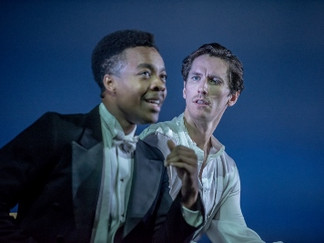The Land of Might-Have-Been
- Robert Beale
- Jul 12, 2023
- 3 min read
Michael Williams, Ivor Novello, Iain Farrington
Buxton International Festival and Norwich Theatre
Buxton Opera House
July 7-21, 2023. 2 hrs 30 mins


Buxton Festival’s forays into musicals in the past two years have been very successful, particularly 2022’s Gypsy, which was directed by Buxton Opera House chief executive Paul Kerryson.
This time it’s something more completely home made, as The Land of Might-Have-Been is a new musical with book and lyrics by Michael Williams, the festival’s CEO. The music is based on scores by Ivor Novello, creating new contexts for numbers from his 1930s shows, some with their original words, some with new ones – it’s a technique called “pasticcio” as applied in baroque opera (something Williams and colleagues recreated ingeniously for their 2019 festival highlight, Georgiana), and in today’s world rather like a jukebox musical.
The Land of Might-Have-Been, however, is not in today’s world. It sets out to tell the story of Vera Brittain and her family, who lived in Buxton before World War One. Her younger brother Edward, and her fiance Roland Leighton were both killed by it, and her experiences as a nurse at the front left an indelible impression recounted in her 1930s book, Testament of Youth. Brittain married in 1925, and her daughter was Shirley Williams, the former Cabinet minister and SDP founder.
So the show is loosely based, as they say, on Vera’s memoir. But that’s not all. It invents an imaginary character called Bobbie, in a gay relationship with Edward Brittain, and parallels one love story with the other (there’s apparently warrant for the interpolation, but it is fictitious).
A musical, of course, is about the music. The finest aspect of this creation is the work of Iain Farrington, who has arranged the Novello melodies for the Northern Chamber Orchestra (in modern pit band form), and woven a varied and extended score using other pieces of the period and his own new composition, including ensemble and chorus numbers. He even manages to have two Novello songs sung at once – something not too intrinsically difficult, bearing in mind their predictable short, balanced phrases and similar chord sequences.
Novello’s popular sentimentalism was so well known in its heyday that it’s been much parodied, and one problem this concept faces is that it sometimes seems almost like send-up. The sequence that ends the first half, in which Farrington cleverly overlays the tune of Keep the Home Fires Burning, a song that Novello wrote while a young man, on other ditties of the 1914 recruitment era, comes across as a kind of O, What A Lovely War! for the moneyed middle classes.
And that’s what Vera and her circle were. Their story, tragic though it was, is not untypical: their background was privilege. The addition of Bobbie to the narrative, with incidents almost duplicated in a sauce-for-the-goose-sauce-for-the-gander pattern, permits some songs to be reinterpreted as Novello (himself gay) might have felt them, but in the end there are rather a lot of them.
We’ll Gather Lilacs (one of Ivor’s best), though heralded in the orchestra many times like a leitmotiv, only makes it into song at the very end – and then, because it seems to be sentimentalising death, is surely misplaced. The fact the show runs a good 20 minutes longer than the estimate in the festival programme tells its own story, and I wonder whether a lot of tightening up, particularly in the second half, might have helped.
The overall impression is also blunted by a staging (director Kimberley Sykes, set and costume design by Nicky Shaw) that paints its era in pastel shades and hazy images, against a crudely geometrical or pictorially simple backdrop, with archways flying down and up again for no particular purpose. Something less mobile but more symbolic and flexible might have been better.
Audrey Brisson leads a hardworking and energetic cast, and Iwan Davies conducts the music with skill and affection.
More info and tickets here






